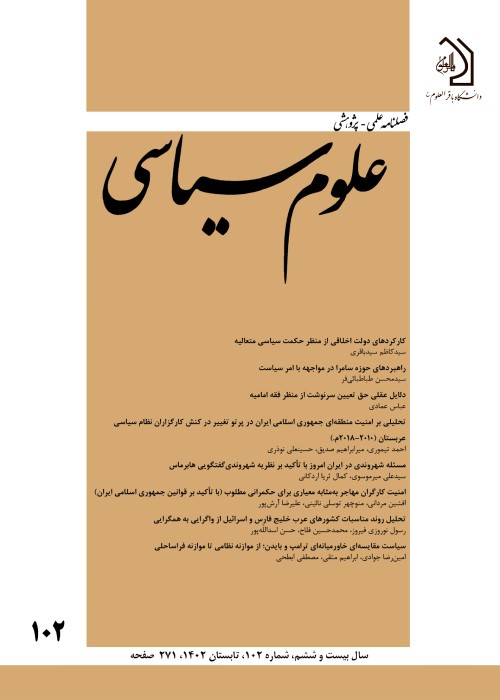An Argumentative Analysis of the Essential Features of the Islamic Revolution from the perspective of Contemporary Political Wisdom
Author(s):
Article Type:
Research/Original Article (دارای رتبه معتبر)
Abstract:
Irrespective of its historical context, the Islamic Revolution exhibits distinct fundamental characteristics that contemporary political thinkers have identified and articulated. Examining these features and formulating them in a persuasive manner can contribute to the development of a comprehensive model of revolution that transcends spatial and temporal boundaries. The primary objective of this research is to address two key questions. Firstly, what are the essential philosophical features of the Islamic Revolution as perceived through the lens of political wisdom? Secondly, how have contemporary philosophers formulated and presented these features in their arguments? To accomplish this, I employ an argumentative approach that involves analyzing the fundamental data found in the works of contemporary political thinkers. This method allows for a comprehensive examination of the essential features of the Islamic Revolution, which can be categorized into two main groups: internal construction and external construction. The internal construction encompasses features such as monotheistic construction, sharia-based construction, conscious construction, while the external construction includes cultural construction, construction based on inner societal transformation, and general construction. Throughout the research, we present arguments supporting the inclusion of each feature in the model of the Islamic Revolution. The findings suggest that the Islamic Revolution possesses distinct characteristics that, while sharing certain similarities with other revolutions worldwide, set it apart. These features can be traced back to intangible sources within the revolutionary society, shaping its internal dimension and defining its fundamental essence. Additionally, other features stem from the objective manifestations of the society, which define how the Islamic Revolution is objectively structured, and yet portray its external appearance. The Islamic Revolution can be characterized as a monotheistic uprising, driven by a profound sense of consciousness and a commitment to sharia. Additionally, by leveraging cultural dimensions and fomenting an internal revolution among the masses, it successfully mobilized diverse segments of society to dismantle the existing ruling system and establish an ideal state.
Keywords:
Language:
Persian
Published:
Political Science, Volume:26 Issue: 1, 2023
Pages:
78 to 116
magiran.com/p2650028
دانلود و مطالعه متن این مقاله با یکی از روشهای زیر امکان پذیر است:
اشتراک شخصی
با عضویت و پرداخت آنلاین حق اشتراک یکساله به مبلغ 1,390,000ريال میتوانید 70 عنوان مطلب دانلود کنید!
اشتراک سازمانی
به کتابخانه دانشگاه یا محل کار خود پیشنهاد کنید تا اشتراک سازمانی این پایگاه را برای دسترسی نامحدود همه کاربران به متن مطالب تهیه نمایند!
توجه!
- حق عضویت دریافتی صرف حمایت از نشریات عضو و نگهداری، تکمیل و توسعه مگیران میشود.
- پرداخت حق اشتراک و دانلود مقالات اجازه بازنشر آن در سایر رسانههای چاپی و دیجیتال را به کاربر نمیدهد.
In order to view content subscription is required
Personal subscription
Subscribe magiran.com for 70 € euros via PayPal and download 70 articles during a year.
Organization subscription
Please contact us to subscribe your university or library for unlimited access!


